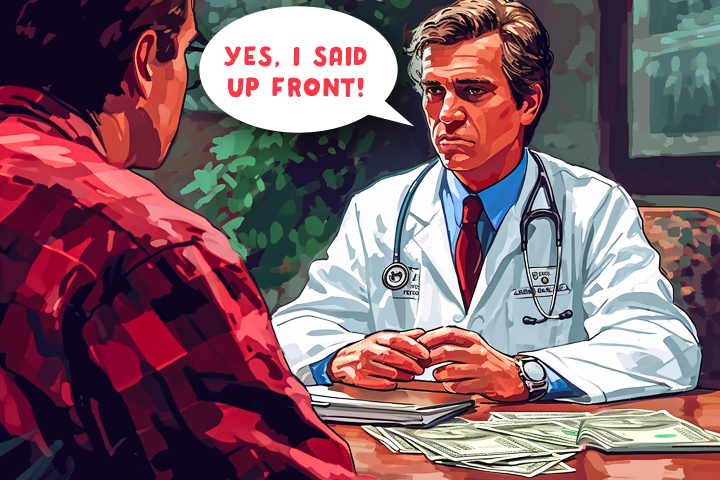
Pretend you’re a cancer patient. You have health insurance and assume that when you show up for your next round of chemo, you’ll be taken care of.
Except this time, the typically nice person at the front desk tells you that unless you pay the entire cost of the procedure – $14,000 – up front, you should just turn around and go home because you’re not getting through any door to see any doctor to get any treatment.
As outlandish as a scenario like that seems, Marshall Allen, the author of, "Never Pay the First Bill: And Other Ways to Fight the Health Care System and Win,” says those nightmares happen far more often than they should.
“I’m hearing more and more about patients with health insurance arriving for appointments where they are told that they won't be treated until they have paid the full price out-of-pocket — including the insurance plan’s portion — before any claim is sent to their insurance plan,” Allen said.
Your money or your life
Deb Ault, founder of Ault International Medical Management, doesn’t mince words when asked about these situations. She calls them real life “your money or your life” scenarios.
As Ault explained, the upfront payment demands run the gamut, depending on the type of service. If it’s a typical, “Hey, I can’t stop coughing” visit, it could be a couple of hundred dollars. If it’s surgery, then the upfront demand could be in the tens of thousands of dollars.
She said the sneaky part is that the medical providers usually don’t demand payment until the patient shows up for the appointment, so then they’re under pressure to pay up or pound sand.
Unethical, unreasonable, illegal?
Allen says that the American healthcare system has a moral problem. “It exploits people’s sickness for profit. … It’s unethical to wait until a patient shows up for an appointment to demand full payment. It’s unreasonable to make the patient front the insurance company’s cost. It’s predatory and blocks patients from getting the care they need.”
But, Allen says the “pay up or go home” approach is not illegal in most cases.
“Clinicians are only required to provide emergency treatment to patients regardless of their ability to pay," Allen said. "If it’s a scheduled or elective appointment, the law doesn’t prohibit demanding payment up front.”
On the other hand, given the state of the economy and the cost of insurance, doctors have their reasons for asking to be paid upfront. Mostly because they’re trying to keep the lights on.
According to the Academy of Healthcare Revenue, if providers request payment at the time of service, they have a 70% chance of receiving it – but only 30% after a patient leaves the building.
Unfortunately, the Consumer Financial Protection Bureau (CFPB) can’t do anything about this. At least not yet.
Since the CFPB regulates providers of consumer financial products and services, it only oversees the relationship between medical providers and patients when the medical provider also provides a consumer financial product or service.
However, Allen answered a reader’s question by saying “If this continues I do think it will need to be regulated. It also may be violating what's stated in the insurance plan documents, but those are not always adhered to and can be difficult to enforce.”
Five ways patients can protect themselves
Allen laid out ways that any patient who’s forced into this situation can protect themselves, as well as what you can do if your medical provider demands payment in full when you show up. Here are five suggestions he has for anyone before they head off to see their doctor.
“Know your health insurance plan. Understand what your plan covers and what it does not. Be clear about your out-of-pocket obligations,” he suggests.
“Find out if your plan prohibits a billing department demanding full payment upfront.”
Call your health plan’s “nurse navigator” – a person who helps a patient from their initial diagnosis to their end-of-life treatment – if you have one. They can usually help you stay on a good and fair path without having to worry about the pitfalls and money monsters.
Share your complete health insurance information when you make the appointment. Ault suggests a) sending a photo of your insurance card so there’s no question, and b) asking whether you need to bring any money to the appointment.
Confirm the financial details in advance with your health plan. "Call your health plan and make sure the services are in-network and covered. Know in advance whether you’ll be asked to pay anything upfront,” Allen said.
Have a Plan B – a back-up. As ConsumerAffairs found out recently, there is an app that can give you prices for procedures at many of the doctors offices where you live. Ault said patients need to keep their options open – going as far as changing doctors, even if they’ve been going to the same doctor for a long time.
And if things go wrong?
You have to be prepared if your best-laid plans go awry, Allen says. And when that happens, his first line of defense for people who are on an employer-sponsored plan is to call their HR person.
“They might be able to enlist your benefits broker for help, or get you connected to some other resource,” he said.
But whatever you do, don’t take the bait if the physician offers you a payment, loan, or credit plan. Be cautious about entering into a payment plan.
If you agree to take them up on that offer, Ault says it's tough to get it corrected on the back end and the interest rates on the credit offers are through the roof – like 26.99% compared to 16% for a typical credit card, warns the CFPB.
Photo Credit: Consumer Affairs News Department Images
Posted: 2024-01-12 12:11:29


















